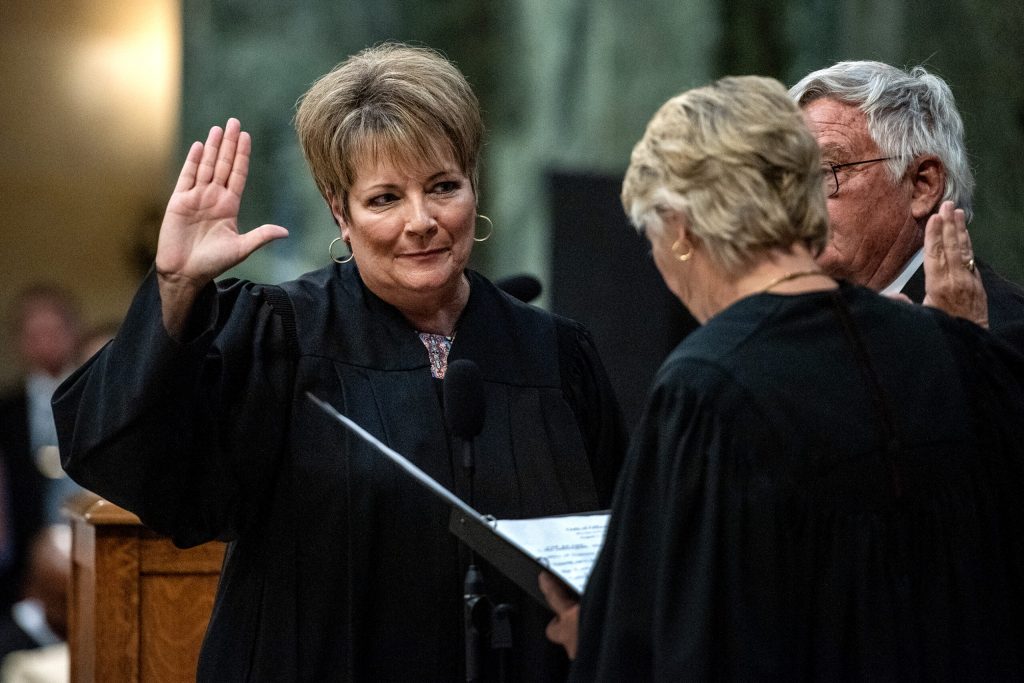Protasiewicz Will Not Step Aside in Racine Voting Case
The Wisconsin Elections Commission says the case could have statewide implications for absentee voting.

Wisconsin Supreme Court Justice-elect Janet Protasiewicz is sworn in by Justice Ann Walsh Bradley on Tuesday, Aug. 1, 2023, at the Wisconsin State Capitol in Madison, Wis. Angela Major/WPR
Liberal Wisconsin Supreme Court Justice Janet Protasiewicz will not step aside from a case challenging the legality of an early voting van used the City of Racine in 2022.
A brief filed by WILL states Protasiewicz promised to stay out of cases brought by Democrats while campaigning for her Supreme Court seat. As a candidate for the court, Protasiewicz said she would not hear cases involving the Democratic Party of Wisconsin, or DPW. While the state party isn’t involved in the Racine voting van case, WILL claims the DNC donated hundreds of thousands of dollars to the DPW, which donated to the justice.
In a separate brief, the DNC argues it is a distinct entity from the DPW and such a recusal would create a “plainly unconstitutional” chilling effect on donations, including judicial donations from the Republican Party.
Elections Commission says January ruling could limit in-person absentee voting
In January, Racine County Judge Eugene Gasiorkiewicz ruled that while state election laws don’t prohibit mobile voting sites like the van used in Racine, it doesn’t allow them either.
The decision came after Racine County Republican Party Chair Kenneth Brown sued over the van, arguing it violates state law because it moves to different locations during early voting. He also alleged the van creates an opportunity to advantage one political party over another because the mix of voters in alternate locations don’t match the mix in the district where the city clerk’s office is located.
“Thus, for municipalities that follow the circuit court’s ‘same’ voting history theory, voters will have only one option to vote in-person absentee: the clerk’s office,” the WEC brief said.
Racine’s mobile voting van was purchased using private donations from the Center for Tech and Civic Life, which is funded by Facebook founder Mark Zuckerberg.
State residents will vote on a proposed GOP-authored amendment to the Wisconsin Constitution April 2, which will decide whether private donations for election administration should continue to be allowed in the state.
Justice Protasiewicz will not step aside in Racine voting van case was originally published by Wisconsin Public Radio.
If you think stories like this are important, become a member of Urban Milwaukee and help support real, independent journalism. Plus you get some cool added benefits.



















A mobile voting van bought by a third party and given to government to drive around for votes!? How would this be legal if other parts of the state dont have financial means to have a van doing this? One would think that voting hours and access to the ballot box should be exactly the same for everyone who lives in this state.
“One would think that voting hours and access to the ballot box should be exactly the same for everyone who lives in this state.” This has never been true, and likely never could be since municipalities set their own rules and hours for operation in all matters of administration and public facing services, as appropriate to their size, geographic location, population density, et. al. FWIW I don’t like the idea of a mobile polling place, but that’s because it seems like its just another of many Covid-related improvisations implemented to try to reduce the need to cram people together to vote. What could make the voting process “exactly the same for everyone who lives in this state” would be to automatically register every eligible voter when they reach majority age and implement universal vote-by-mail. Hours of operation for clerks would still vary, but access to the “ballot box” would indeed be identical for all voters in Wisconsin.
There are three Constitutional Amendments guaranteeing the rights of citizens to vote with support from the Federal Voting Rights Act of 1965. With these precedents, it is hard to understand why judges will allow most all of these “voting rights” lawsuits to move forward.
I love the framing of the headline, she “will not step aside”, like she is being obstinate rather than doing her job as a judge.
Making things “exactly the same for everyone who lives in this state,” is neither fair nor equitable. Such a policy, which penalizes the poor and disabled, is exactly why Congress passed the Americans with Disabilities Act in 1992. To make things equitable, we must take into account citizens’ needs and barriers; and create systems that give everyone equal access. So people who are home bound, that means giving them access to absentee voting; for those who do not have access to transportation to polling places or the county clerks office, that means bringing voting access to them. Does this give a political advantage to one party over the other? Yes it does but only because RRRs (radical reactionary republicans) have consistently turn their backs on the needs of the poor, elderly, and disabled. RRRs could go after these blocs of voters but that requires they listen to them. RRRs have not made a habit of listening to voters.
One final point, voting is not a right. It is a responsibility of citizenship in this country. Well past time we remove the barriers that prevent citizens from fulfilling their civic duty.